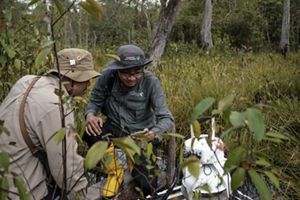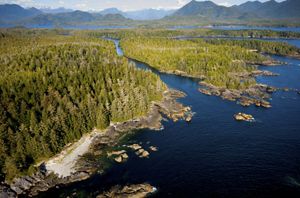Scaling Natural Climate Solutions With Integrity and Impact
How TNC leveraged a $100 million gift to support local communities in climate action and conduct foundational research for natural climate solutions.
In late 2020, The Nature Conservancy announced a transformative $100 million gift from the Bezos Earth Fund to support our work on natural climate solutions around the world.
Combined with cutting fossil fuels and accelerating renewable energy, natural climate solutions offer immediate and cost-effective ways to tackle the climate crisis—while also addressing biodiversity loss and supporting human health and livelihoods.
Our monthly insights, straight to your inbox
Get our latest research, insights and solutions to today’s sustainability challenges.
Sign UpOver a three-year grant period, the funds have helped us expand our work developing and implementing nature-based solutions to climate change around the world. We’ve done this by partnering with local communities, developing on-the-ground projects and conducting foundational research.
The Bezos Earth Fund has supported these initiatives:
Catalyzing Natural Climate Solutions
In 2017, science led by TNC showed that nature is a critical part of the solution to climate change. With this grant funding, our team has sought to answer fundamental questions:
- Which actions are most effective and where?
- How much will it cost to activate these actions?
- What are their tradeoffs and potential benefits?
- How do we rapidly measure and scale up successful models?
To help answer these questions and advance natural climate solutions more effectively, TNC developed a suite of tools:

NCS Prototyping Network
To date, this network encompasses 15 projects in 13 countries, engaging 120 partners to inform NCS action across nearly 686,000 hectares, benefitting around 54,000 people.
Explore the Projects
Naturebase
This open, web-based tool shows why, where and how to implement projects with the highest carbon mitigation impact while improving livelihoods and protecting biodiversity.
Get Global NCS Data
NCS Playbooks
These six playbooks map science-based activities for nature-based climate action—to inform decision-makers and practitioners globally about where effective, immediate actions can address the climate crisis with proven NCS.
Download the Handbook
NCS Science
Our ongoing science, research and case studies demonstrate how nature can help increase carbon storage and avoid greenhouse gas emissions around the world.
See the latest scienceProtecting Living Carbon Reserves in the Emerald Edge
Stretching across Southeast Alaska, British Columbia, Washington and Oregon, the Emerald Edge, has been home to Indigenous First Nations, Alaska Natives and coastal Tribes for millennia. Here, TNC and Nature United (our Canadian affiliate) are part of a movement toward Indigenous- and community-led conservation of the world’s largest temperate coastal rainforest.

Protecting Old Growth Forest in Clayoquot Sound
The Ahousaht and Tla-o-qui-aht First Nations have worked together with the Government of British Columbia to protect about 76,000 hectares (188,000 acres) in Clayoquot Sound.
Celebrate this historic moment
Emerald Edge Carbon Map
Developed to support communities, industry, governments and Indigenous Peoples to make data-driven decisions about projects that can best increase carbon storage.
Explore the map
NCS Accelerator
We worked with partners across the region to build a database of more than 60 projects that have the potential to collectively sequester 10 million metric tons of CO2e over 40 million hectares.
Learn about the region
Major Milestones
The Bezos Earth Fund support has been essential to TNC’s and Nature United’s ability to engage long-term and understand the complicated dynamics of protecting forests and supporting Indigenous partners for lasting stewardship.
See the lessons learnedQuote: Eric Delvin
I appreciate how we have remained committed to our core values of supporting Indigenous rights and authority, listening respectfully and following community leadership—while experimenting our way forward to understand the intersection of natural climate solutions and community authority.
A Promising Solution in Northwest India’s Soil

Northwest India is the most productive rice and wheat growing area in South Asia. Traditional practice for farmers is to burn rice crop residue before preparing fields for wheat planting; but the practice emits dangerous greenhouse gasses, reduces soil fertility and hydrology, and contributes to nearly half of Delhi’s air pollution on some days, endangering the health of almost 70 million people.
TNC is working with partners including the Borlaug Institute for South Asia to eliminate the practice of burning crop residue in northwest India, and there is a promising solution that can cut that number in half by 2023.
The Happy Seeder is a machine that mulches farm residue and sows seeds for the next crop directly into the mulched soil, providing a no-burn, no-till approach that can reduce greenhouse gas emissions by almost 80% and saves 500,000 liters of water per hectare.
It is also up to 20% more profitable for farmers than burning, but it is not yet widely recognized as an option and TNC is working to change that.
A major barrier is influencing communities to move away from the long-standing traditional practice of sowing on a clean seed bed; the Happy Seeder is a new technology and training on its proper use is urgently needed to ensure farmers experience positive results quickly and, therefore, and adopt it. Our work is focused on demonstrating this technology and promoting it to farmers.
Sign up for Global Insights Newsletter
5-Minute Climate Solutions
Come along each month as we explore the latest real-world solutions to the most complex challenges facing people and the planet today, all in 5-minutes or less.







